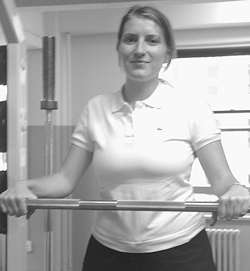By Judith Stiles
The chatter on sports radio these days has been all about Yankees star pitcher Randy Johnson and his less-than-stellar performance on the mound, with faithful fans making all kinds of excuses for his falling star, and armchair critics psychoanalyzing his every move. A few brave souls have entertained the notion that Johnson’s nonperformance is not really a psychological problem. Instead, as one fan put it, “He is no spring chicken! He is 42, and he’s old!” There are many opinions floating around the radio waves as to “how he should get his head in the game” or get “his mojo” back. But is this psychobabble, or are there fundamental psychological issues that athletes should examine if they are in a slump?
Laini Hodges, sports psychologist at Velocity Sports Performance on E. 58th St. in Manhattan, has concrete suggestions for athletes when they find themselves in a slump or choking in big games. First, athletes should try to recall the best performance they ever had. And be specific, visualizing the circumstances, their relationship with their coach at the time and their personal life.
Next, athletes are advised to set aside the bigger picture and stop focusing on the game’s outcome. Rather, they are to concentrate on smaller goals, such as executing a certain specific kind of pitch or where the soccer ball should be placed in the back of the net. If the voices of the coach and the fans are creating internal stress and a lot of pressure, athletes shouldn’t just block it out, because as Hodges explains, “If you try to block the stress out of your mind, it will only bounce back and bother you.” Hodges says it is helpful to “take inventory of the stress, recognize it, reframe it and then let it go.” She encourages athletes to create a physical ritual, such as kicking the stress away in the dirt, or picking up a handful of grass and symbolically tossing it away.
According to Hodges it is not just professional adult athletes who suffer from pregame anxiety, choking in games or difficulty with anger management.
“There is too much pressure on kids to perform, in part because our culture is so obsessed with sports, and many parents are living out their personal sports dreams through their children,” she points out.
When asked what she would recommend to a parent whose 10-year-old son vomits before big games due to anxiety, she recommends:
1. Take the lead from the child by asking him on a nongame day what would he prefer the parents to do and say on game day. Ask the child what works best for him.
2. On game day stick to a routine: same breakfast, same suiting up for the game, same rituals, etc.
3. If the child wants to be quiet before the game, let him do that. If he wants to talk, be a good listener.
4. Be positive and supportive, but only in the way the child has said works best for him.
5. Emphasize learning and having fun and remind him life goes on after every game, win or lose.
“For adults and children it all boils down to performance issues, whether or not it involves sports, public speaking, theatrical or musical performances,” says Hodges, with a knowing smile. She explains that performance issues surface during transitions, such as recovering from injuries, when youth players are suddenly bumped up to playing in highly competitive leagues, when college players graduate and even with professionals who face retirement. A great deal of time is devoted to training the athlete’s body for maximum performance while the mind is often neglected.
Up until recently, most athletes felt stigmatized and embarrassed to seek the help of a sports psychologist. However, many coaches and players see the benefits of “training” the mind to develop focus, anxiety control and positive short-term goals. Several online counseling services have sprung up for athletes, such as peaksports.com and behavioralassociates.com, that even claim to build “aggression enhancement,” which addresses hidden fears about being too aggressive, which can inhibit performance. The counselor tries to move the player toward releasing a drive for “natural dominance,” which will hopefully create success.
If online counseling feels too remote, there is nothing like sitting and listening to the wise and steadying voice of Hodges, who will look you right in the eye with her own sparkling brown ones, as she identifies and tackles any kind of sports performance problem. Her personal experience is in individual sports, and armed with a master’s degree in sports counseling from San Diego University, she offers a wealth of good advice to adults and children individually. She even spearheads a program out of Velocity that counsels entire teams, with gems of good advice on how to mentally prepare for the “big game,” or any game at all where the mind seems to be tripping up the body.
For more information on Velocity Sports Performance, call 212-593-3278 or e-mail laini.hodges@gmail.com.






































